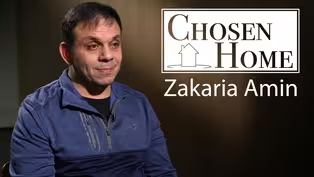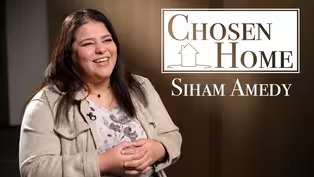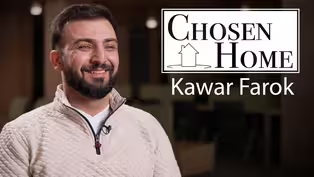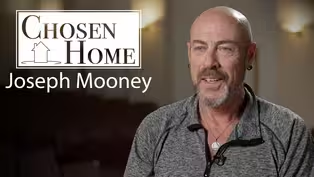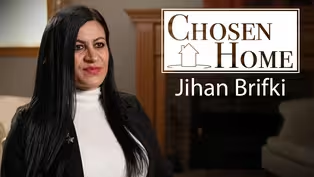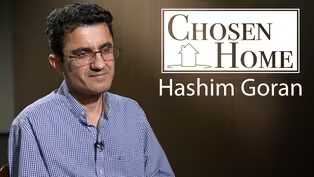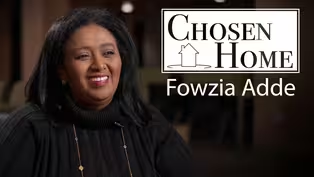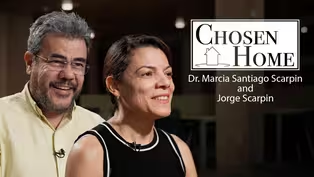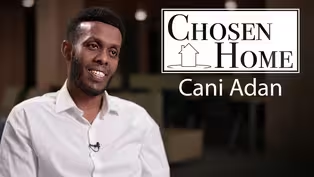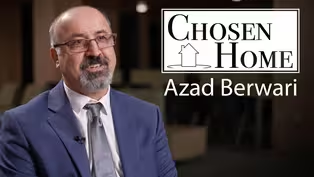Chosen Home
Chosen Home: Jihan Brifki
Clip | 5m 59sVideo has Closed Captions
Jihan Brifki shares her immigration story.
Jihan Brifki shares her family's story of fleeing Iraq, the hardships of life as a refugee, and becoming a leader in the Moorhead, MN community.
Problems playing video? | Closed Captioning Feedback
Problems playing video? | Closed Captioning Feedback
Chosen Home is a local public television program presented by Prairie Public
Chosen Home
Chosen Home: Jihan Brifki
Clip | 5m 59sVideo has Closed Captions
Jihan Brifki shares her family's story of fleeing Iraq, the hardships of life as a refugee, and becoming a leader in the Moorhead, MN community.
Problems playing video? | Closed Captioning Feedback
How to Watch Chosen Home
Chosen Home is available to stream on pbs.org and the free PBS App, available on iPhone, Apple TV, Android TV, Android smartphones, Amazon Fire TV, Amazon Fire Tablet, Roku, Samsung Smart TV, and Vizio.
- My name is Jihan Brifki.
I was born in Kurdistan which is north of Iraq.
We fled Kurdistan, region of Iraq, in 1988 due to the ongoing war that was happening in Kurdistan, region of Iraq.
We would go to the mountains for safety.
I was probably like two years old, three years old.
My mom was a single mom with six kids.
It was really hard for her to go and join other families and hide in the caves because we were kids, and we would be loud.
So that was really difficult on my mom.
And from hiding in the cave, our family started walking to Turkey, going for about, I believe, it was four nights and five days of walking.
So we did reach the Turkish border.
That's when Turkey refused to open their borders, to let us into their land as refugees.
So that's when it was either let us in, or if we were returned, we would all be slaughtered and killed.
So United Nations got involved and pretty much forced them to open their borders, so we can go into Turkey and stay there as refugees.
The camp was pretty much a desert.
There was no trees, there was no bathrooms, there was no water, electricity, nothing.
Each family was given a little tent, maybe that was good for two to three people.
And our families lived in these tents for four years.
There was a day where there was no water.
So the people in the camp were getting really frustrated.
They wanted to go into the Turkish towns to get water, but the Turkish soldiers secured like all the borders.
So we were not allowed to leave and come and go as we pleased in the camps.
And I remember, like being right in front of the tent and all of a sudden I heard bullets, like they, the Turkish soldiers just started shooting at everybody.
And I was about, maybe four years old, five years old at the time?
And all of a sudden I saw my brother collapse right in front of me.
He got shot right in the arm, and then he got shot in the waist.
When my brother was in the hospital, because his arm was so destroyed, they said that we have to amputate your arm.
And he got very emotional and he said, "If you guys cut my arm off, I'm going to kill myself.
I will not live without an arm."
So we were so, so lucky, right?
While he was in the hospital, my family was notified.
Okay, like your family has been chosen to go to the United States.
My brother's like, "This is my only chance at surviving."
And we've gone through so much in Kurdistan.
If we go back to Kurdistan, you know, there's still ongoing conflict.
There's still Saddam, there's still his regime, there's still war.
I mean, it's not safe for us.
And my brother said, "I'm making the decision, and we are going to the United States."
When we left the Turkish camp, we had no clothes, no extra clothes, no suitcases, nothing.
It was just us.
It was my mom, it was myself and my two brothers, and my sisters, and my nephew.
It was very difficult for my mom because, I mean, due to the ongoing conflict, the war, she never had the opportunity to get her education.
So she was not able to read, write, in her own language.
And then coming to the United States with these little kids and not being able to speak English, not being able to drive, getting a job was almost impossible for her.
Because coming here as a new immigrant and not knowing the language, not knowing how to fill out paperwork, drive, you know, I was able to learn English quickly because we had good friends and good support.
And you know, my brothers, my sisters, we all promised ourselves when we were old enough to work, we would get ourselves a job and, you know, support our mom and try to live better.
You know, growing up in Fargo-Moorhead, it was honestly like one of the best experiences for me because I never felt like I didn't belong.
My profession is I'm a licensed interpreter.
I work with the US government, United Kingdom clients, Canada, and also, all 50 states working from home.
And I also do local interpreting.
I do a lot of projects with Immigrant Development Center helping immigrants.
We have a program, Driving for Success, where we're helping immigrant women, you know, that are new to the country or are having a difficult time learning how to take the permit test.
And also to, you know, behind the wheel where we're covering all of the cost, and we're getting a program together, helping them study their permit test.
Each time that we've done it, we were able to help 10 women in the community get their driver's license which is great.
That gives them empowerment.
They're able to go to work and find a job.
So that's been a great project that I've been able to accomplish because this is a place for opportunity, you know?
Like, I don't know, I just get really emotional because if I had not come here, I would not be who I am today, you know?
Like my kids would not have the life they had.
My siblings would not have the life they had because we didn't have the the American dream.
Yes, it's hard to live in America, but it's all up to you.
So I feel like America has given me that opportunity that I never thought in a lifetime, you know, this little girl trying to survive genocide, end up in the United States and become this big voice for my people.
I'm just so grateful that, you know, we were able to be part of the community and also contribute as much as we can.
- [Presenter] Funded by the Minnesota Arts and Cultural Heritage Fund with money from the vote of the people of Minnesota on November 4th, 2008, and by the members of Prairie Public.
Video has Closed Captions
Clip | 6m 13s | Zakaria Amin shares his immigration story. (6m 13s)
Video has Closed Captions
Clip | 4m 36s | Siham Amedy shares her immigration story. (4m 36s)
Video has Closed Captions
Clip | 6m 18s | Kawar Farok shares his immigration story. (6m 18s)
Video has Closed Captions
Clip | 4m 24s | Joseph Mooney shares his immigration story. (4m 24s)
Video has Closed Captions
Clip | 5m 59s | Jihan Brifki shares her immigration story. (5m 59s)
Video has Closed Captions
Clip | 7m 45s | Hashim Goran shares his immigration story. (7m 45s)
Video has Closed Captions
Clip | 6m 14s | Fowzia Adde shares her immigration story. (6m 14s)
Chosen Home: Dr. Marcia Santiago Scarpin and Jorge Scarpin
Video has Closed Captions
Clip | 7m 25s | Dr. Marcia Santiago Scarpin and Jorge Scarpin share their immigration story. (7m 25s)
Video has Closed Captions
Clip | 5m 19s | Cani Adan shares his immigration story. (5m 19s)
Video has Closed Captions
Clip | 5m 46s | Azad Berwari shares his immigration story (5m 46s)
Providing Support for PBS.org
Learn Moreabout PBS online sponsorshipSupport for PBS provided by:
Chosen Home is a local public television program presented by Prairie Public
